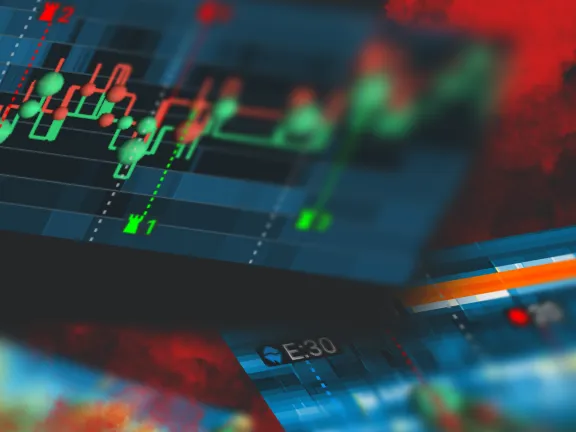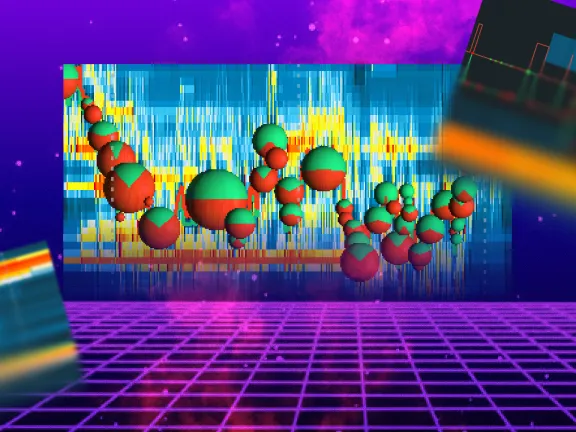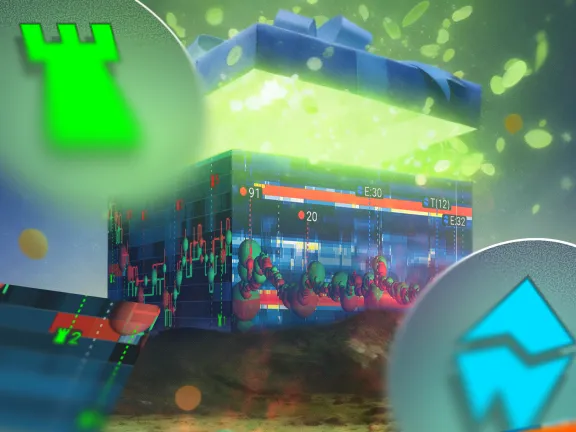

December Trading
Deals Are Live!
Save on Global+, data access,
and add-ons.
See All December Deals

Black Friday
Nov 28-Dec 31
17 days : 4 hours
50% OFF Global+ Quarterly
+ 50% OFF Data (3 months)

Cyber Monday
Dec 1 - Dec 31
17 days : 4 hours
60% OFF Global+ Monthly
+ Data (1 month)

Add-on Deals
Dec 1 - Dec 31
17 days : 4 hours
50% OFF
Add-ons

New Year Sale
Dec 26 - Jan 1
11 days : 4 hours
30% OFF Global+ Lifetime
*Data not included
Interviews
February 17, 2024
SHARE
From the Airline Industry to Trading With Bookmap
This interview is based on a conversation with David W, conducted and edited by Owain Higham.
I’m curious about your background. Could you tell me how you discovered trading, maybe tell me about your first trade?
Well, my first trade was bad! [He laughs]. But no, ever since I grew up in the states, every morning as a teenager I would go to the library and read the newspapers, and the first section I was somehow always attracted to was the financial part where they were talking about stocks. So I was always a bit fascinated by it.
My entire career, I never spent time doing anything with it, other than what most retail people do, which is getting into something when they get FOMO and think they can make a quick buck. I never really understood what was behind it until later, when I started trading a bit with cryptos. I made a few good “smacks” on that, getting into the peaks and selling out at the bottoms. I guess that’s what everyone that gets into trading for the first time runs into.
Before coronavirus, I changed my goals to what I wanted to achieve later in life, because I had achieved everything I wanted career-wise. I was an operations manager for an airline. I did dispatch, I was basically running the airline with the team there. I wanted to go back flying at first, because I’m originally also a pilot. I got my pilot’s license when I was 13 years old in the military school I went to in America, but my career shifted to remain on the operation side of the airline business.
Right before coronavirus, I was already trading a bit, but I started to really dig into the materials. I started studying more, the basic technical analysis kind of thing, and I just somehow like the way it works. To find a passion for something, for me what works is if you make it fun to do. I like gaming as well, and that’s where Bookmap also came into play.
Thankfully it came in quite early, and it may sound corny, but it kind of gamified trading and made it much more easier to understand. I did a lot of studying, a lot of book reading, then I decided to start shifting towards a full-time trading career, because this is one of the steps I want to take to achieve something greater later on. I’m still in this beginning phase, I would say, before I get to the next step. I’m still loving it every day.
It has cost me a lot of hours. In the beginning it was very lonely, because I did it by myself. I did have a mentor that was trading on the trading floor here in Amsterdam, on the AEX. He only shorts, basically. He does it more on his own feelings. When he finds that the price is too high, he’ll enter a short position and just wait a few days until the next fall comes, and he’s always right! He’s been doing that for 40 years. The thing is, he has the patience to do it, and that was a big test for me as well, because one of the biggest downfalls I had in the beginning was just not having the patience to wait. I always got out of my trades too quickly, and in the end, 90% of them went in the direction I thought, but I closed out too soon or I had my stops in the wrong place. I think a lot of people have those mistakes, you panic sell at the bottom while you should be doing the opposite.
I was about to ask you about your biggest mistakes, but I think you’ve just told me!
[He laughs]. Yeah. Of the biggest mistakes I made, it was buying at the wrong places and selling at the wrong places, and totally not understanding what was going on with the markets, you know? I guess I let greed take over, because you want to make a quick buck, and it just doesn’t work like that.
The biggest mistake I made then was with bitcoin in the beginning, when you buy high and you’re a bit leveraged. I didn’t understand how the crypto market was working when it came to liquidations and that kind of stuff, you just get wiped out all of a sudden. Taking on too much risk, even with bitcoin, you get stopped out and you see it reverse the next day into where your target was. So it was really frustrating in the beginning.
Bitcoin is very volatile, that’s why it’s so attractive to traders. But if you don’t tame it, it will destroy you.
Yeah, you really need to manage it with proper risk management, and I had no clue what I was doing then. If I look back to 4 years ago, it’s like, what was I even thinking, you know? I would just slap myself across the face! If I only knew what I know now. [He laughs].
So what do you know now? If you could go back, what would be the one thing that you’d say “change this”, or “do this”?
Hmm. [He pauses]. “Get the FOMO out”. That I really worked on in the past 3 years. Now when I see something jump up, I would be like: Oh my God, I’m gonna miss this boat. I need to get in, and now I’m just like: Wow. What’s next? If it’s gonna go up, it must come down at some point. Then I start looking at the technical part of it, when it comes to volume and price analysis, market structure, and then I just make new plans based on that.
I think my strategy has changed a lot. In the past I was always looking for bargains, trying to find beat-down stocks, waiting for them to jump out, but now I just don’t do that anymore. Now I just create my plan, basically wait in the bushes, and I snipe. I manage to find myself a bullet somehow, and I keep it as simple as possible. In the past I was always trying to look for new indicators, for what would help me, and I came to realize it doesn’t work—none of it does. It’s always lagging. In the end, the only thing it can do is maybe confirm your thesis in what the trade is going to be, but it’s not going to tell me when it’s gonna go, and where it’s gonna go, except for when I know there are ‘memories’ in the stock price, or somewhere where it goes. The most difficult environment where I don’t trade is when something is at all-time-highs or uncharted territory. I just stay away. Because you know it’s gonna go down at some point. I like when it’s trading in a certain range, and that’s why I trade the S&P a lot, and the NASDAQ.
I’m focusing a lot on US markets, but I do plan to get into the crypto world again sometime. I just think it’s important if that works for me and I can put my focus just on this for now, I don’t need anything else.
How long have you been trading now?
I’ve been trading full-time now for about 2 and a half years. But I’ve been trading for about 5-6 years now.
What gave you the confidence to go full-time?
I just liked it. I like the world, I like the analysis of it, of doing it. What specifically gave me the confidence to do it? I don’t know. It’s a good question, because it’s something you grow into, I think. The first thing is that you need to enjoy what you’re doing, the second is – is it going to fulfil your needs? My third one is I’ll be able to achieve certain goals in the future, which I wouldn’t be able to achieve when I was doing some other job. Those were my motivations to do this.
So trading isn’t the end goal for you, it’s a stepping stone to something bigger?
Yeah, it is.
Obviously without telling me all your secrets, can you tell me more about how you trade?
I have 3 three different trading styles. I’m a bit into options as well, but that I’m too new to, so I mostly paper trade options at the moment. When I’m scalping the S&P 500 or the NASDAQ, I can either buy the futures contracts, or you could also get into a call and scalp it. So I’m sort of playing around with it in my training environments to sort of move away from that, because the returns you can get from scalping options are a bit greater and require less capital as well. The only thing I’m still struggling with sometimes is liquidity and getting the contracts filled. But I do like the charts, because I chart the pricing of the options. I’m actually trading the price of the option that I’m in, not the instrument itself, but it works almost the same way. It’s really weird, it’s really interesting.
In the S&P I just wait for certain stop runs. I have different plays. They’re a bit more risky, but I have my mental stops; I know what I can risk on certain things. But whenever those stop runs happen, I jump in really quickly, and then I’m out just as fast. The volatile things are where my strength is. When it comes to ranging markets, I like the volatility in it, because that’s what makes me go. Whenever I’m in a market that’s only trending up or trending down, that’s when I do bad, and I just stay away.
Because there’s no predefined place to manage risk?
Yeah, and actually, I’ve been doing pretty good on that. Tom B is one of the mentors on Bookmap, and he does a fantastic job in explaining how the market structure works—and it’s all free, it’s just incredible. You don’t wanna know how much money I’ve paid in the past for courses trying to find my edge. What he has taught me in this past month has changed the game for me in a lot of ways. I’ve seen my performance jump up incredibly this past month, it’s insane. It also opened up a new door in seeing how you could do things differently. I have so many ideas that all of a sudden came up because of this. I just almost don’t have the time or the resources to be able to try it out. I don’t know where to start. So I’m sort of in this re-grouping stage for myself, and I’m just parking it away for a minute. I’m still trying to focus on the core of what I’m good at, and then slowly experimenting with more things to my trading style. It keeps evolving.
There’s always room for improvement. I see it in every trade. I analyze it at the end of the day, I review everything I did. On the weekends I open up Bookmap and do replay sessions as well, where I go back and grade myself, say: Ok, I went in too quick, or I went in too late. I even do it with the stop runs, even though it goes so fast. You can always find something where you could do it better next time, and it does work.
How deep into the reviewing process do you go?
Well, when it comes to events and that kind of stuff—like this afternoon when CPI comes out—unless something approaches a level on my higher time frame where I’m building a core position for the longer term, something where the trade really comes to me, where I have some things already planned out, that’s when I jump in.
I don’t really look at the exact session. I do look at what time certain events happen, but I have my alarms set already for when I know a reversal will occur. There are certain times of the day where the same pattern occurs. Okay, not exactly to the minute, but it’s sort of like clockwork. You have these certain times of the day where something changes. I guess a bank decides to buy something, or someone comes into the office and presses the button that day, whatever it is. I just know something will go on that day, and it doesn’t matter to me which way it will go that day, because I have a plan for both ways.
Especially for the review part, I look more at the technical part. If I get stopped out, I’m gonna ask myself: What is different from my trading plan, why did I get stopped out? It’s not like I always put in a hard stop. I trail them as soon as I’m in profit and see something reach a certain obstacle where I would scale it out or something like that. I do move it up, but other than that I give it room to breathe. If you scale out and you already let part of it go, then your breakeven also goes to a different point, so it gives you more room to wait it out or pull to plug at a later time.
Those are the types of things I analyse, and then I try to go back and then calculate to see where it would have been different. Not like it would change the outcome of the trade in any way, but it does give me a bit of preparedness for next time to maybe get myself into a different situation, or not be in that situation again. If I recognise certain behavior or patterns, then I’ll recognise almost the same thing going on, and I just know: this is going to be my buffer.
You’ve clearly put a lot of time and energy into trading, improving over the years. But what are you working on right now? What is your biggest weakness that you’re trying to improve?
Well, I still have fear entering into trades at some points. I play it out mentally in my head, but because of platform issues sometimes—not specifically with Bookmap, but more with the broker or the internet lagging and distractions around me, I become insecure about entering and executing it. But I think that everyone is fighting with it at some point, and that’s what I’m trying to overcome. Everyone’s afraid to lose money, of course, and that is something I have learnt to let go. For example, I don’t have any PnLs up anymore, I don’t look at money I’m making or losing, I don’t specifically look at that. I just know that when I enter a trade, I have a specific amount of lots and if I get stopped out, I know already generally how much it’s going to be. But I’m not focused on what the exact number is anymore, I just focus more on the execution and the proper entry and exit.
I think that’s a process I’m still in, and I also know that when I’ve managed to tame it a bit more, it’s gonna open new doors for me, because on the paper side of it where I don’t have that fear, it really shows how successful I am in my strategy. Sometimes I do wish that I had that exact same feeling I have in the live environment that I do when I’m paper trading, because if I manage to completely switch that around, my goal will be achieved. But then again, I don’t want to achieve it that quickly, because I still want to be able to trade for the next few years. [He laughs].
I don’t think I’m ever gonna stop trading, by the way. My goal is that I want to create an angel investor fund because I grew up in an environment where people were struggling when it came to money and achieving dreams. I have everything that I need, we’ve always worked hard together with my partner in achieving whatever we wanted. We’ve travelled the entire world, did everything. But if there’s one thing I wanna achieve in the future, it is to give chances to other people that don’t usually get the chances to do things, so that’s my motivation for doing it, and I keep that in the back of my head all the time. I will get there some day, but this is one of the steps I need to get there, and if it’s gonna take a few years, that’s fine. The good part is I am doing something that I love doing, it’s not something that I’m ever gonna stop doing. I’m going to be trading until my last breath probably [he laughs], because I really love doing it, and I start to enjoy it more and more every day. It’s a way of life for me. You can do it all over the world as well, you just need a laptop.
In the end, I try to keep it simple. That’s what works best, and that’s the biggest lesson I learned in the past few years: the more complicated you make it, the more difficult you are going to make it for yourself. For anyone that is doing this, try to find your strength and just keep repeating that into whatever you want to achieve.